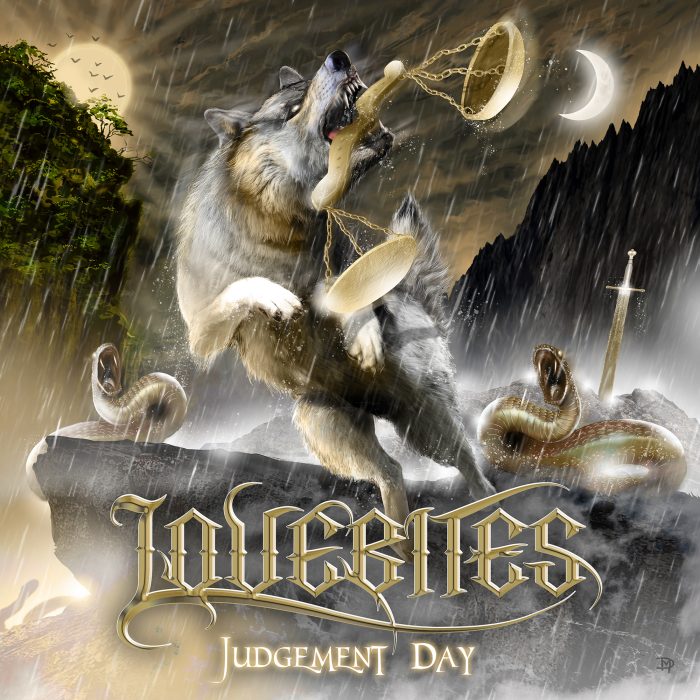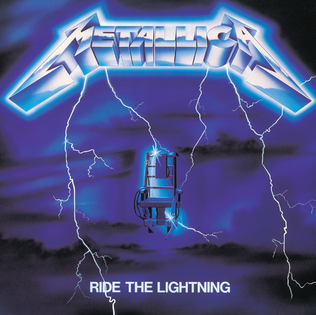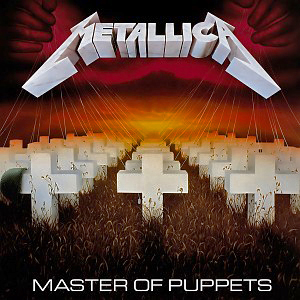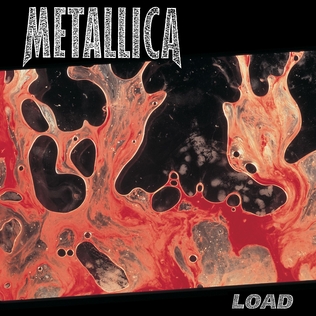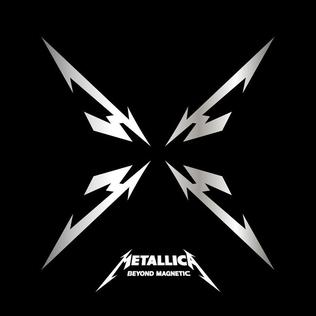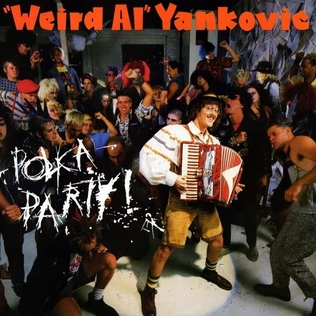With Metallica coming out with a new album this year, I figured I would take the time to go back through their catalog for a retrospective article! For this one, I haven't bothered with the various live album the band has released, instead focusing on the main studio stuff, the two S&M releases, and one notorious collaboration (oh, we'll talk about it!). While I generally don't cover thrash metal too much on the blog (mostly as a matter of focus, as I do like the genre), Metallica always had a strong sense of melody as part of their sound, which I think helped elevate them to the status that they have today. As the band's history is pretty well-known (and not terribly complicated, honestly), I'll mostly be focusing on the music for this one.
Kill 'Em All (1983)While Metallica technically started in LA, their frustrations with the glam metal atmosphere and subsequent shift to San Francisco to recruit Cliff Burton, the band started crafting a much more furious style of metal that pushed the boundaries of the genre at the time. Inspired by the edgier side of the NWOBHM scene and throwing in a hefty dose of punk aggression, thrash metal was born.
Between the artwork (which was a revision from something more crude and comical) to the opening track "Hit the Lights," I imagine folks back in 1983 could tell this was not your typical metal material. Among all the tight riffing and high-speed tempos are Hetfield's shrieking vocals, matching the intensity of the music perfectly. This band was certainly not interested in operatic bellowing or soulful crooning. And after that initial punch in the face, the album really doesn't let up, instead insisting on pounding the listener from the beginning to the end, with few breaks in the assault.
Listening to it now, it's definitely the band at their most raw, hoping that passion and aggression will carry the songs over their quirky songwriting and low-budget production. Not that it's a bad sounding album, as that old-school sound does add to its charm, and it retains a solid amount of clarity. For me, it's an album shows how much promise they had, while still not quite mastering what they had created. My favorite tracks are the last two "Seek & Destroy" and "Metal Militia." The former gives us one of their earliest anthems, while the latter is an excellent high-speed shred fest that helped give thrash metal its identity. This album was a statement, and considering how influential it was on many extreme metal band to follow, that statement was certainly heard.
Ride the Lightning (1984)After touring and playing new material in Europe, Metallica decided to record their second album in Copenhagen, Denmark. Already, the band was showing considerable growth and maturity, not only in their lyrics, but also in the more complicated and diverse arrangements of their songs, likely caused by Cliff Burton's passion for prog rock and classical music. If Kill 'Em All was a sign of the band's potential, then Ride the Lightning was a fulfillment of that potential.
The production also improves along with the song-writing and performances, finding the best balance between a huge, anthemic vibe and the aggression of Kill 'Em All. The result is an excellent album that drifts well between its tones and ideas without losing any consistency in power whatsoever. The riffs are heavy, the rhythms tight, the solos fierce, and Hetfield's vocals tearing through it all with confidence and passion. Nothing was left on the table when it came to the writing and recording on this album, despite being kind of rushed to make it in time for a European tour later that year.
I'll be honest: this is my favorite album from them, and one of the greatest metal albums ever recorded, in my opinion. Starting with the aggressive "Fight Fire with Fire" and "Trapped Under Ice," then going on through the excellent title track to the introspective "Fade to Black" to the epic "For Whom the Bell Tolls" and "Creeping Death" to the doomy "The Call of Ctulu," the album provides a full array of what metal can be. I even like "Escape," despite it being despised by the band in recent years as a cheap attempt at a more commercial track. This was the first Metallica album I had ever heard, and to my newly found power metal sensibilities, I wasn't quite sure what I had heard. However, I couldn't put it down, as it had an immense impact on me that drew me in, and now, over 10 years later, I still love listening to it, relishing in its iconic sound that perfectly balances thrashy aggression with anthemic power!
Master of Puppets (1986)Now that the band had two albums under their belt, and their audience was growing, they shifted to Elektra Records for their next album, recording it in Ulrich's homeland of Denmark. The goal was to take what they had done with Ride the Lightning, but go bigger, harder, crazier, and it's clear that they certainly pushed themselves to the next level.
The production is beefier, the songs are longer, more dynamic, and more complex, for sure. The proggy side was definitely coming out, with many of the songs featuring mixed meter or tonal diversions that take their songs into new territory, and the title track is renowned for exemplifying all these and more. The lyrics also show a shift from conventional metal tropes into more themes of isolation, depression, dependency, and manipulation, giving the album a more grounded quality while they reach for more anthemic riffs and bigger arrangements. This album would go on to be one of the most influential in all of metal and in extreme metal in particular.
So it puts me in a bit of a bizarre place that I find this album to be just okay. Sure, the first two tracks of "Battery" and "Master of Puppets" are an excellent two-some, making for some the best songs in their catalog, but I find the rest of the album to be a bit of a mixed bag. "The Thing That Should Not Be" tends to drag a little too much, and both "Disposable Heroes" and "Damage Inc." feel a little too chaotic for their own good. Even the instrumental "Orion" feels lackluster compared to the incredible "The Call of Ctulu." I'm definitely in the camp that considers Ride the Lightning to be the better album, but I recognize that Master of Puppets pushed the band onward, progressing and improving beyond just thrash aggression and into the global institution they would eventually become.
...And Justice For All (1988)After the sudden death of Cliff Burton, the band was definitely reeling, but after some encouragement from Burton's parents, they carried on. They eventually took on Jason Newstead as their replacement bassist, and pretty much everyone knows what happened next. While there have been dozens of reasons and excuses given as to why it happened, but it really doesn't change the fact that the production is very flat. It's really a shame, as I do think this has some of the band's most dynamic and diverse song-writing across their entire discography.
Right off, the progressive elements are front and center, as most of these songs are pretty long and feature not only some complex riffing, but significant shifts in the songwriting, allowing the band to really flex their skills. While the lyrical topics grounded and full of that classic Metallica frustration, they're definitely pushing into epic territory. "One" tells a full-on story (inspired by the anti-war film Johnny Got His Gun), starting with ambience from a battlefield before going on to its dark tale. These riffs are huge and definitely designed to fill stadiums, not just the small venues where they started. The aggression of the opener "Blackened" or the huge riffs on "Shortest Straw" and "Harvester of Sorrow" are a testament to this, along with "One." Despite the bad production, the band simply pushed themselves to be bigger and meaner than ever.
I actually wrote a quick little review back when they released a 30th Anniversary remastered version. While much of what I said is still true, I should have expressed how much this album has grown on me over the years. I know when I first heard it, struggled with it, but it's definitely become one of my favorites with repeated listens. While I do think the album kinda front-loaded, as the last three tracks don't seem as strong, the overall effort to push their limits has made this album one of my favorites of theirs. Yes, that means I like it more than Master of Puppets, and to be honest, I'm not really quite sure why. This just clicks better for me.
Metallica (1991)Probably the most divisive album in their entire catalog, known as "The Black Album," their self-titled entry into the 90s set a precedent for the band that they're still following to this day, for better or worse. After getting frustrated with the complex nature of playing the Justice material live, and being impressed with the rich production of some of their glam metal competition, the band set out to rethink their approach and make a statement about what Metallica was going to be for the future, with notorious mixed reception.
Right from the beginning with "Enter Sandman," we get their new, streamlined, concentrated approach. A catchy melody into some powerful, bass-friendly, anthemic riffing, it sets the standard for how the rest of the album was going to be. While they hadn't really abandoned their sound, they definitely had sharpened it to something fiercer, but also more accessible. Whether it's the heaviness of "Sad But True," the sarcastic wit of "Holier Than Thou," the storytelling nature of "Wherever I May Roam," or the aggression of "Through the Never," the band took what had worked before and polished it into a new level of freshness. This, along with their two big ballads "Nothing Else Matters" and "The Unforgiven" would help them become a household name across the world, though perhaps not everyone liked the reasons why. While I do think the last few tracks make the album drag a little, they definitely earned their success by rethinking what made them who they are.
Did Metallica sell out? For what it's worth, I'm not really inclined to think so. I don't think they necessarily made these stylistic changes for the sake of money or reaching for a bigger audience. They were burned out on what they were already doing and needed a shake up, and their efforts to refocus happened to result in their best selling album ever, even to this day. Rush did the same thing in the early 80s, and no one seems to fault them for it (as far as I can tell, anyway). Nevertheless, the anti-fandom of Metallica had started, one that I think has become pretty overblown over the years. While I don't think the band is perfect (see what I have to say for their next two albums), I do think that sometimes, with popularity, come the anti-bandwagoners who mistake tearing down what's popular as intelligent or informed criticism. In the end, though, Metallica likely doesn't care, as they're laughing all the way to the bank.
Load (1996)Despite making one of the biggest metal records of the 90s (if not all time), Metallica was strangely hesitant to really keep pushing in that direction. In an era dominated with grunge and the rest of alternative rock, all while the metal underground was pushing into more and more extreme territory, Metallica found themselves without a foundation other than what they had already established. So, leaning into the comfort and wealth their last album had made for them, they basically set out to make something pretty self-indulgent, and the result is long, sloggy mess.
Well, maybe I've tipped my hand a little early on this one. It's not like the band was working from nothing. Clearly inspired by stoner metal bands like Kyuss, southern rock, some of the heavier grunge material from the likes of Alice in Chains, and leaning a little harder into a bluesy delivery, the album is very clearly not just The Black Album 2. The lyrics are also reminiscent of the grunge style, focusing on very personal topics, such as their own grief of lost loved ones and the battle with various addictions or mental struggles. It also ends up being one of their longest albums, and even an entire minute of the closer "The Outlaw Torn" had to be cut in order for all of it to fit on the CD format. Buyers were certainly getting their money's worth on this one.
I can't deny that I really struggle with this album, though. As much as I'm inclined to defend their self-titled blockbuster, I really do feel like the band lost their way here, and I can barely make my way through it's ridiculous runtime without feeling like I'm falling asleep. "King Nothing" and "Wasting My Hate" are only the bright spots for me in a pool of stagnant, sluggish leftovers that any decent band would have dismissed as b-sides. I'm sure there are fans of this album, but I definitely do not come back to this Load very much at all.
Reload (1997)And as if one album of it wasn't enough, they pumped out a second one. Apparently, the plan was to do a double-album of over 150 minutes of material, but studio time was getting rough, and they figured they should break it up across two years to space things out a little better for listeners. While I think this album is just another load of rubbish, I do consider Reload to be the better of the two. I like three or four songs on this one, which is mathematically more than the two I liked on the last one.
Pettiness aside, it really is more of the same, plodding, sluggish, bluesy metal the band had put out just the year prior. After a promising opener in "Fuel," things downshift back to mid-tempo chugging for pretty much the rest of the album. "Better Than You" and "Prince Charming" bring back some of the energy, and while I'm not big on the studio version, "The Memory Remains" has become a live staple for good reason. Hearing the crowd sing that melody is usually a highlight of their concerts. Still, I do think that both this and Load have this complacent, living-off-the-fat vibe that makes me think they really weren't pushing themselves very much at all. It's a band in cruise control, more than anything else.
Garage Inc. (1998)Over the years, on various EPs and singles, Metallica would cover songs from their influences, often a lot of NWOBHM or punk rock bands. When they got back into the studio after touring on Reload, the decision was made to loosen up a little and record a bunch more, then bring in the previous covers and release it as a big, double-cd compilation album. It's not really a vital or defining release, but it is very Metallica, as they are known for playing covers frequently on their tours.
With 27 tracks and over 2 hours of content, there's quite a bit to parse. While Metallica do put their own spin on the songs, there are some noticeable trends based on what their covering. The punk covers definitely have a more aggressive edge. The classic rock covers tend to fit into the slower Load/Reload style. However, when they get to the NWOBHM bands, the thrashiness returns, which makes sense as they started by covering many of those songs. The older covers naturally have a bit more menace, as most of them were from their thrash years. If there is one thing that remains through all the tracks, it's a sense that the band is just having fun with the material and not really thinking too hard about the songs other than to give them a dose of Metallica heft.
Having this many tracks, stand-outs are inevitable. From the first disc that are the newer covers, I liked their grittier take on "Turn the Page," and both "Die, Die My Darling" and "Astronomy" were pretty fun. The second, older half of the covers are highlighted by "Am I Evil?" and "Breadfan", which they've played many times live over the years. Overall, it's a pretty decent collection of songs that allows the band to blow off some steam.
S&M (1999)During all of that, Metallica was also working with Michael Kamen about doing a symphonic Metallica project that ultimately resulting in a pair of live shows that got recorded and turned into this live release. While they had worked with Kamen before on "Nothing Else Matters," here it's pretty clear he wanted to add quite a bit to the songs, giving them his own unique touch. In my opinion, while some of the orchestrations feel a little bland, other tracks really benefit from it, such as "The Call of Ctulu," "Fuel," and "Enter Sandman." At the very least, it's fun to see a live orchestra play "The Ecstasy of Gold" as the band members walk on stage.
Unfortunately, the setlist does include more than a few tracks from Load and Reload, but I will admit that the orchestrations make them more tolerable, and hearing the crowd singing the counter melody on "The Memory Remains" is a highlight. There are also two new tracks, "No Leaf Clover" and "Minus Human." Both are pretty solid, though I think I like "No Leaf Clover" a little more. Something about the menace in the chorus is catchy while still being fatalistic. Overall, it's another fun little package that provides some interesting symphonic thrash metal and captures a very interesting moment in the band's history.
St. Anger (2003)Ah yes, St. Anger. One of the pariahs of the metal community, and a common cudgel the many anti-fans love to beat the band with, and certainly not without good reason. Finding themselves at quite the crossroads, not only losing their bassist Jason, but also feeling incredibly irrelevant in a metal scene awash with a wave of nu metal metal, Metallica really had to take a good, hard, deep look at themselves and come to terms what it even meant to be Metallica, or even if they wanted to be in the band anymore.
The result is a very messy album that I think does have some bright spots amidst the flaws, though the flaws are many and easily identifiable. First is the production: in an attempt to try and sound raw and aggressive, they sought a sound that was trying to be raw much like Kill 'Em All, but ended up with something just sounds muddy. Second is, of course, Lars's ridiculous snare drum. The story goes he had mistuned his drum, hit it, and it rang out with that now infamous sound, and I guess he loved it, putting it on through the entire album, much the chagrin of listeners. Third, the lack of guitar solos, which ended up being a kind of concession to then contemporary metal trends, instead focusing on riff fests that don't really do much for the songs. While I admit I'm not necessarily the biggest fan of Hammett's solos, I know he was frustrated by this, as were many of the fans. Finally, the album is just long and repetitive. It feels like they just copy-pasted sections of songs to pad them out, often repeating verses or riffs ad-nauseum.
And yet, I still kinda like it, and it's pretty much for one reason: energy. After enduring Load and Reload, St. Anger felt like a jump start. Kicking of with "Frantic" and then moving into the title track, this was a band that no longer was lazy but instead hungry, and desperately searching for how to move forward. I also like "Dirty Window," "Invisible Kid," and "Purify." To be clear, a lot of my appreciation for this album comes from the documentary they did on the recording, Some Kind of Monster. While it doesn't necessarily make the album better, knowing the story behind it helps to make sense of why it is the way it is. I won't deny that it's still a mess, and some of the songs are pretty forgettable, but I do think this was an album they needed to get out of their system, and as such, I think makes for an important turning point for the band.
(For what it's worth, there actually was a project called STANGER2015 where a handful of musicians took the album, gave it a good production, fixed the snare, and even reduced some of the repetitiveness, making the album an entire fifteen minutes shorter. It's worth checking out, even if just to consider "what could have been," as I do think there are a lot of good ideas in St. Anger, buried under all the problems.)
Death Magnetic (2008)Having finally worked through their issues, and picked up a new bassist Robert Trujillo, Metallica found themselves in the middle of a thrash metal revival, with many new bands bringing back the old styles of the 80s. I admit I'm not certain how much of an influence these bands had on Metallica, but it was definitely perfect timing for a "return to form" album like Death Magnetic. Ulrich stated in interviews that they were aiming for the sonic space between And Justice For All and The Black Album, and they definitely nailed it.
Of course, the production would be a sticking point, as this time the audio was compressed to make the music seem louder as part of a loudness war that was going on at the time. I've never been too bothered by it myself, though, especially when the music is so good. Things start with "That Was Just Your Life," and right off, gone is the messy style of St. Anger or the languid nature of Load or Reload, as the band is back to complex riffing and arranging, making some great thrash metal once again. The band clearly felt like they had something to prove. I also think the near-live-like nature of the recording gives the album a very practiced and vital sound.
After such an impressive opener, they carry on with more thrash intensity. I quite like "The Day That Never Comes," even if it does feel like a retread of "One," and "All Nightmare Long" is a personal favorite of mine. However, much like Justice, I feel like the album loses some steam in the second half. "Cyanide" feels like a left over from St. Anger, "The Judas Kiss" gets a little messy sometimes, and I don't know if we really needed a third "Unforgiven." Fortunately, the album has a great closer in "My Apocalypse," providing a solid storm of fury that's also one of my favorites. This album came out just as I was getting into Metallica, and I've loved it ever since. I'm even willing to say this is their best album since Ride the Lightning!
Lulu (2011)And just when I thought the band was doing well again, they put this out. Apparently, Lars is a big fan of Lou Reed, and when they met and performed at the Rock and Roll Hall of Fame 25th Anniversary Concert, they hit it off pretty well, with Lars being excited by Reed's idea of a concept album based on the Lulu plays, written by Frank Wedekind, a German playwright from the turn of the century. Eventually, they decided to come together and make it happen, and this is the result. Some might scoff at the idea of even including this as part of the retrospective, as it definitely feels more like a Lou Reed project that happens to have a lot of Metallica on it, but I don't really listen to Mr. Reed's stuff, so I lump it in with Metallica in my digital music library, and it's a part of the band's history now, no matter how much we may want to deny it.
For the record, yes, I have listened all the way through this thing twice. Once, when it came out, and again for this retrospective article. While part of me dreaded having to do this, I couldn't help but wonder if a second listen might not reveal more of what's going on here. While I have perused the above-linked Wikipedia articles, this album isn't a narrative recreation, but instead takes a handful of scenes and concepts and builds songs on them. Well, "songs" might be a bit generous, as many of them feel like bizarre post-metal jams. There are some dynamics, as it drifts between ambience and chugging riffs, but it often repeats the melodies and lyrics over and over ad nauseum. Metallica drones on in a psychedelic haze, with some ambient strings in the background, and Lou Reed speaks his poetry over the top in a way that makes me wonder if he's even following the music. Any attempt at understanding what's going on is like trying to hear an opera on the other side of a brick wall. This stuff is nearly impenetrable.
Of course, this album is pretty notorious now, though it does have a few champions. There are a few tracks that feel like proper songs, like "The View" and "Frustration," and there are some decent riffs sparsely sprinkled through. Otherwise, it's a lot of ambience and mood, mostly in one depressing tone the entire way through, making it pretty forgetful. While I don't want to begrudge a band for trying something new, this really is a project that goes over the edge. Unless you're interested in the subject matter it's "adapting" (and I use that word loosely), this is perfectly skippable.
Beyond Magnetic (2011)Reeling from the PR disaster that was Lulu, Metallica quickly put out the remaining Death Magnetic tracks that didn't make it onto the album as an EP to help celebrate their 30th Anniversary. Fans had seen pieces of them before in their Mission Metallica behind-the-scenes documentary series for Death Magnetic's recording sessions, but here, they were finally bundled together in a rough, demo-like form.
As much as I love the album these tracks were intended for, these are some pretty lackluster songs. Featuring some strange transitions, some rather bland chugging, and times where it feels like the songs are long for the sake of being long, they tend to be somewhat forgettable. Maybe if they had chosen one of these to be on the album, they would have tightened it up, making it better, but I guess they were confident in leaving these behind. "Hate Train" feels the most complete, and is worth a listen or two, as it builds well, but the rest don't do much other than draw attention to the better material on Death Magnetic.
Hardwired... to Self-Destruct (2016)So, after all of that and a bunch of touring, Metallica eventually make their way back to the studio again. However, this time, Kirk Hammett lost a bunch of his recorded ideas when his mp3 player got stolen from an airport, which meant he didn't have much to contribute, making this album very much the Hetfield and Ulrich show. Unfortunately, this means that the album resembles the Load/Reload period quite a bit. While there are some good moments on here, there are too many filler songs that go on for just a little too long.
The album starts out well, with the title track being an explosive blast of punky energy. This is followed by the best track on the album, "Atlas, Rise!", as the band wears its NWOBHM influences on its sleeve. The dual guitar harmonies are quite nice. From there, "Now That We're Dead" and "Moth Into the Flame" are some decent chuggathons, but after that, album loses me. Suddenly, we're back in the languid, uninspired swamp from the mid-90s, where the songs just drag on and on. Even "Murder One," which is dedicated to Lemmy who had just passed away at the time, is just sluggish and repetitive. "Motorbreath" back on Kill' Em All was a better tribute to the metal legend than this. The album ends with an attempt to recapture the power of "My Apocalypse" with "Spit Out the Bone," and nearly succeeds. Unfortunately, the track is marred by a strange musical digression in the second half that does the song no favors.
Once again, we get a very lazy, complacent Metallica effort that stretches things out to barely justify a double album to pump up the sales numbers. I'm certain that if they had dropped a few tracks, and shortened some of the ones that remained, we could have had something pretty good. For what it's worth, I do consider this album to generally be better than either Load or Reload, and not just because the count of songs I like is higher. However, 8 years after the excellent Death Magnetic, this is quite the let down.
S&M 2 (2019/2020)After more touring and charity projects, they also decided to do another symphony project for the 20th anniversary of S&M, replaying some of the tracks and including some new pieces. While Michael Kamen had passed away by this time, they brought in Edwin Outwater and Michael Tilson Thomas to handle the orchestrations, though I'm sure they used Kamen's arrangements for many of the tracks.
The setlist is generally alright, adding in a few tracks from the newer albums, and the return of "No Leaf Clover" is nice, but there are no new original songs this time. Instead, they've chosen to include some classical pieces from the turn of the century from some Russian composers. The first one is just the orchestra, and has a very cinematic feeling. The second one has Metallica with the orchestra, but just ends up being very repetitive and mechanical. Neither of them really stand out all that much, in my opinion. Overall, the performances are solid, and the crowd add a nice touch in places. However, it doesn't do a whole lot that the first S&M didn't do, making the sequel just another decent, novel live album.
Now that I've listened to all of this, I'm about as ready as I could be for the new album. I've already liked a few of the singles, and I'm hoping they stick with the more uptempo songs instead of falling back into their complacent Load/Reload style of songwriting. I guess you'll find out how I feel when I post the review for 72 Seasons next week! Until then, rock on! \m/



